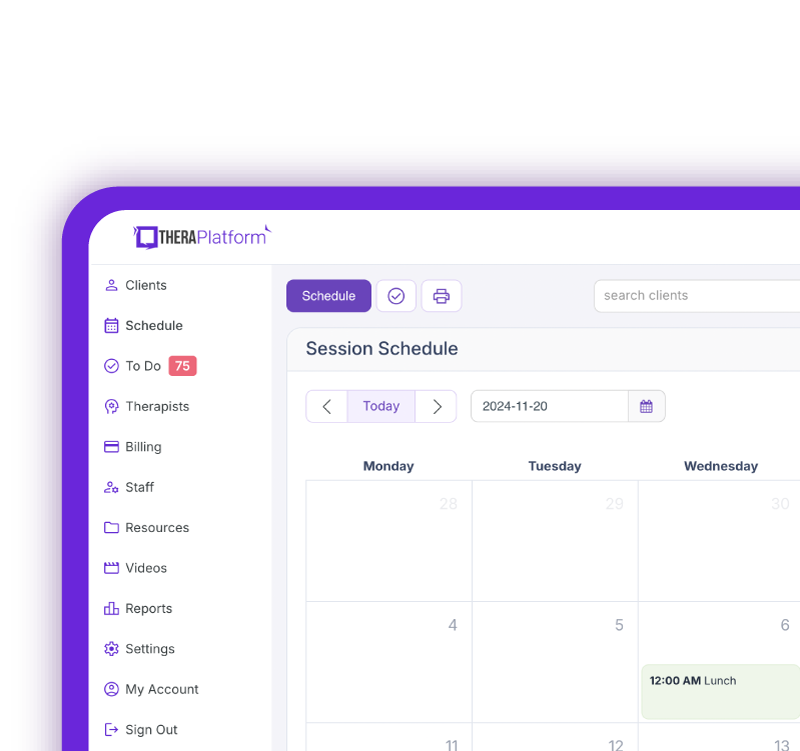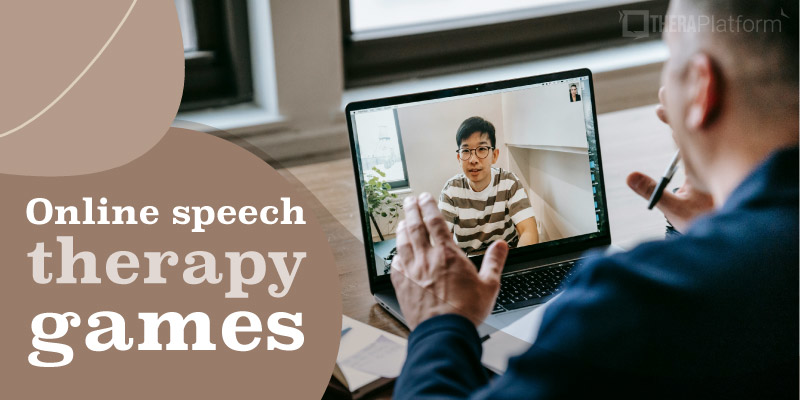Social skills activities through telehealth

Social skills activities and language groups through telehealth can be an effective way to bring clients together from anywhere, target individual therapy goals, and build meaningful peer connections.
Summary
- Telepractice allows SLPs to run effective social skills and language groups, even for low-incidence disorders, while supporting both individual goals and peer interaction. Enrolling in a teletherapy course for therapists can help providers enhance their knowledge.
- A consistent session structure (greeting, review, lesson, practice, wrap-up) helps keep children engaged and ensures progress across sessions.
- Digital tools like YouTube clips, PDFs, shared Google Docs, and virtual games make group activities interactive and adaptable online. An EHR may help therapists organize and manage such tools with ease.
- Research shows that outcomes from online social skills groups are comparable to in-person sessions, expanding access for children in rural or underserved areas.
→ Click Here to Enroll in My Free On-Demand Top to Bottom Teletherapy Video Course [Enroll Now]
Telepractice also allows Speech-language-pathologists to run therapy groups for clients for communication disorders with low incidence (such as stuttering), who might not typically have the opportunity to interact with one another.
But how can Speech-Language Pathologists manage multiple clients and keep them engaged while also targeting individual therapy goals through telepractice? By incorporating the right tools, session structure, and activities.
Streamline your practice with One EHR
- Scheduling
- Flexible notes
- Template library
- Billing & payments
- Insurance claims
- Client portal
- Telehealth
- E-fax

Common questions about online social skills groups
How do I target individual goals in a group?
Treating clients with unique therapy goals in a group setting is best done by focusing on the big picture - weaving individual targets into group activities in a natural way.
For example:
- One client is working on using greetings, another is practicing answering wh- questions, and a third is targeting conversational turn-taking.
- Think of the collective goal or activity as engaging in conversation.
- Assign one client the role of the “host” to start the session. The group could then watch a short video that is paused intermittently, prompting another client to ask the other clients a comprehension question. This client practices taking conversational turns while another client targets answering wh- questions.
SLPs can effectively target individual goals in a group setting by considering each client’s strengths and difficulties when planning group treatment sessions.
How can more than one client join a session?
Look for a teletherapy platform such as TheraPlatform, that allows multiple participants to join one secure meeting room.
Each client should be able to log in separately to ensure compliance with HIPAA.
Can social skills activities and groups work over telepractice?
Yes, social skills activities and language groups run via telepractice have been shown to be effective.
A study of social skills groups for 34 adolescents with Autism conducted through Brigham Young University showed no significant differences in social interaction outcomes between groups held online versus in-person.
Teletherapy also provides improved access to therapy services that some children with Autism, such as those living in rural areas, otherwise may not receive.
Practice Management + EHR + Telehealth
Manage more in less time in your practice with TheraPlatform

Sample social skills activities teletherapy session plan
Here’s what a teletherapy group session plan might include:
- Greeting and catch-up: Each client says hello to the other group members and shares something they did since the last session. This targets Individual goals such as initiating conversation or greeting others.
- Review: Briefly review the topic from last week’s lesson, such as “say it versus think it.” This helps reinforce previously learned skills and prepares clients for the new lesson.
- Targeted lesson: Introduce a new lesson, which might include watching a short video clip (see the list below for ideas) for modeling that you pause intermittently to discuss the social cues involved.
- Guided practice: Coach clients as they practice the new social skill through role-play conversations or paired tasks in breakout rooms. Use digital tools like PDF uploads or Google Docs to support clients.
- Wrap-Up: Engage in a discussion to verbally check clients’ understanding of what was covered. Review the lesson’s main takeaways.
Repeatable session structure for social skills activities
Children thrive on routine, and a consistent structure of group social skills activities sessions facilitates that, especially in a virtual setting.
Consider using a repeatable structure such as:
- Same start and end routine (e.g., taking turns saying hello/goodbye)
- Consistent sequence (warm up, lesson, practice, review)
- Visual schedule (displayed on screen so clients know what to expect)
Free Resources for Therapists
Click below and help yourself to peer-created resources:

Tools to use for social skills activities
Keep your clients engaged during online social skills activities therapy by incorporating a variety of digital tools.
- YouTube: Video modeling clips, short social stories for a variety of social skills.
- PDFs: Worksheets, visual supports, comic strips, conversation prompts that can be uploaded to your screen.
- Google docs/slides: Shared Google Doc or Slide presentations can be used as a collaborative whiteboard, allowing clients to move virtual objects, type and draw together.
- Video chat: Clients can practice social skills involved in conversation by chatting face to face (virtually).
- Interactive games and websites: Virtual board games can be used for practicing turn-taking. TheraPlatform offers built-in apps.
20 YouTube videos for social skills activities
Here are some top YouTube videos that can be integrated into social skills groups over teletherapy, with insights on how to use them.
- Eye Contact: SEL: Eye Contact Social Story: While watching this social story, pause and ask, “what do you notice about their eyes?”.
- Introductions and greetings: Video Modeling Introductions & Greetings: After watching, ask the clients to try it out by greeting each other and introducing themselves in pairs or within the group.
- Greetings: Hello! Kids Greeting Song and Feelings Song (Super Simple Songs): This catchy song can be played routinely at the beginning of the group song as a review of how to greet others and express feelings.
- Responding to greetings: Let’s Learn How to Greet: Teaches clients through modeling how to respond when others greet them.
- Emotions and Empathy: Meet Riley’s Emotions! Inside Out 2 Disney Kids: This fun clip introduces Riley’s various emotions in the movie Inside Out 2. Use this for clients to practice labeling emotions and for a discussion on empathy.
- Making Requests/Politeness: We ask for things politely! (Could You... / Can You...?) – Polite Requests Song: Reinforces the use of polite phrasing as socially expected when making requests.
- Expected Manners: Please, Thank You and Asking for Permission • Good Manners for Kids: Teaches clients to use basic socially polite forms of language (such as “please” and “thank you”)
- Asking for help: Teach Kids How to Ask for Help (52 Essential Life Skills series): Describes situations where it is appropriate to ask for help, and how to do so.
- Body language: Everyday Social Skills: Understanding Body Language: Clients learn how to look for hints for understanding body language, such as posture, gestures, and facial expressions.
- Interpreting nonverbal language: Teaching Kids About Body Language: After showing this video, ask clients to imitate various gestures and guess their meaning.
- Empathy: Perspective Taking: Introduces the idea of empathy and the concept that understanding someone else’s point of view does not always mean you agree with it.
- Perspective taking for school-aged clients: MindUP Lesson 10: Perspective Taking (Grades 3-5): Ask clients to complete the perspective taking worksheet that is linked to in the description of this video as they watch.
- Perspective taking for younger children: Practicing Good Perspective Taking Skills Social Story Kids for Kids: An introduction to what perspective taking skills are, and how it helps clients become good friends to others. Pause and discuss the stories and scenarios pictured throughout.
- Emotions and body language: Use All the Cues - a feelings + body language rap for kids!: A fun song that teaches clients to use clues such as facial expressions and body language for insight on others’ feelings.
- Interpreting gestures/non-verbal cues: The Body Language Song - Learn Feelings & Gestures for Kids: This short, simple story can be used as a warm up for a lesson on interpreting nonverbal communication cues from others.
- Identifying emotions: Emotions Game for Kids…BINGO!: Download the free game board, then clients play by guessing the emotion based on a picture shown or situation described.
- Expressing anger (younger clients): Daniel Gets Mad, by Daniel Tiger’s Neighborhood: Reinforces the concept that being angry is okay, and there are safe ways to express it, such as taking a break or talking about a problem.
- Compromise: Compromising with Others: After showing this video, pair up clients to practice as they choose a game to play or create a collaborative virtual art project.
- Think it or say it: Social Skills Video Lessons: Think It Or Say It: Provides video modeling of social scenarios of when it would be most appropriate to keep thoughts to oneself versus saying them out loud.
- Avoiding repetition: “Two Way Conversations: Don’t be a broken record!” by Super Simple Social Skills: This video can be shown to school-aged children to reinforce why it is important to add new information to a conversation. Ask clients to pair up and try the skill out after watching.
Free Resources for Therapists
Click below and help yourself to peer-created resources:

Tips for group therapy management online
When conducting online social skills activities with language groups, there are a few ground rules that are helpful to follow:
- Establish expectations: Review basic rules and expectations at the beginning of each session. For example, use the virtual hand raise feature to speak, and take turns talking.
- Over-plan: Come prepared with plenty of extra activities for the session in case you have the time available.
- Take advantage of tools: Screen sharing activities and using annotation tools can help maintain clients’ focus.
- Embrace natural teaching scenarios: Distractions like a sibling coming into the room or pet walking by are inevitable during teletherapy. Turn this into a teachable moment to discuss and model appropriate reactions.
As the Language, Speech, and Hearing Services in Schools publication states, “Telepractice is here to stay”. Group therapy is no exception. Social skills groups can be run successfully over teletherapy with the right tools and structure.
Choosing the best HIPAA-compliant teletherapy platform
Telehealth use has skyrocketed since the pandemic, with teletherapy emerging as a trusted, convenient, and secure alternative to in-person care for both children and adults. Therapists and clients report high satisfaction, and teletherapy now accounts for 13–17% of U.S. healthcare visits.
To protect privacy, providers must use HIPAA-compliant video platforms. The top platforms not only secure sessions with encryption but also support scheduling, billing, documentation, and client portals to streamline practice management.
The best teletherapy platforms go beyond video conferencing. By combining compliance, reliability, stable video, resources, games and practice management tools, they help therapists deliver care that’s safe, effective, and adaptable to modern client needs.
Marketing is also another aspect of owning a practice that can be conducted through a secure HIPAA-compliant platform as you can communicate with existing clients via chat, email and more.
Why therapists choose TheraPlatform as their teletherapy platform
Whether for solo practice or larger clinics, therapists choose TheraPlatform for its blend of usability, flexibility, and robust telehealth tools.
Watch this video to discover how TheaPlatform elevates Telehealth sessions
Here are top reasons why therapists choose TheraPlatform for teletherapy:
- Efficiency and convenience: Everything down to payments, scheduling, documentation, and insurance claims is managed in one integrated platform, saving time and reducing friction.
- Security and compliance: TheraPlatform is fully HIPAA and PIPEDA compliant, with encrypted video sessions, secure data storage, and 24/7 monitoring for peace of mind.
- Engagement tools: Built-in interactive features like whiteboards, games, media sharing, screen annotation, and therapy-specific “apps” enhance client engagement especially useful in pediatric and speech therapy.
- Client-centered functionality: The secure client portal empowers clients to book sessions, complete forms, submit documents, and make payments, reducing admin work for the therapist.
- Customization and flexibility: Therapists can create and customize templates for notes, treatment plans, and intake forms allowing them to tailor workflows to their practice style.
- All-in-one practice management: Combines telehealth, EHR, billing, insurance, scheduling, and documentation, eliminating the need for multiple tools or software.
- Therapy-specific design: Unlike generic telehealth platforms, TheraPlatform is purpose-built for mental health, speech therapy, OT, PT, and more with features tailored to each specialty.
- Professional credibility: Recording features, branded portals, and compliance tools help therapists present a more professional, trustworthy experience to clients.
- Positive user experience: Therapists appreciate having everything in one place and often report a smoother workflow, fewer tech issues, and faster onboarding.
What therapists are saying about TheraPlatform telehealth
Therapists praise TheraPlatform for its ease of use, seamless scheduling, and built-in billing tools like superbills. They value the platform’s features including intuitive charting, customizable notes, and interactive telehealth tools as well as the responsive support team, which listens to feedback and implements updates.
Many highlight that the platform offers the best of all worlds, combining excellent video conferencing with resource sharing and an engaging, client-centered teletherapy experience.
"There's seriously no better platform out there! Easy to use … syncs to your personal schedule, provides superbills …"- Coastlinespeechtherapy (Source)
“It is not just the platform, it is the team behind TheraPlatform, always willing to help and receptive to feedback to bring updates requests to live,” Orly, Smarty Therapy PC (Source)
"The video conferencing is excellent and the ability to share resources and the interactive screen make Telehealth a rich experience."- Kathy J. (Source)
"TheraPlatform has been the best of all worlds! … intuitive charting, in-system billing, customizable notes …"-Kendrah B. (Source)
Streamline your practice with One EHR
- Scheduling
- Flexible notes
- Template library
- Billing & payments
- Insurance claims
- Client portal
- Telehealth
- E-fax

Resources
TheraPlatform is an all-in-one EHR, practice management, and teletherapy software built for therapists to help them save time on admin tasks. It offers a 30-day risk-free trial with no credit card required and supports different industries and sizes of practices, including speech-language pathologists in group and solo practices.
More resources
- Top-to-bottom approach to launching teletherapy on-demand video academy
- Teletherapy worksheets
- Teletherapy blog
References
Christopoulou, M., Drosos, K., & Petinou, K. (2022). Recent advances of telepractice for autism spectrum disorders in speech and language pathology. Neuropsychiatric Disease and Treatment, 2379-2389. https://doi.org/10.2147/NDT.S384300
Frizelle, P., & McGill, M. (2022). Prologue to the forum: speech and language tele-intervention: the future is now. Language, Speech, and Hearing Services in Schools, 53(2), 233-236. https://pubs.asha.org/doi/10.1044/2022_LSHSS-21-00188#:~:text=and%20their%20settings.-,Conclusion,stay:%20The%20future%20is%20now !
Grogan-Johnson, S. (2021, March). The five W's meet the three R's: The who, what, when, where, and why of telepractice service delivery for school-based speech-language therapy services. In Seminars in Speech and Language (Vol. 42, No. 02, pp. 162-176). Thieme Medical Publishers, Inc. https://www.thieme-connect.com/products/ejournals/html/10.1055/s-0041-1723842
Masse, M. L. (2024). Online vs. In-Person Delivery of Social Skills Group Intervention for Autistic Adolescents: Comparison of Social Behavior Outcomes. https://scholarsarchive.byu.edu/cgi/viewcontent.cgi?article=11711&context=etd
FAQs for social skills activities using telehealth
Can individual therapy goals be addressed in a group teletherapy session?
Yes. SLPs can weave individual goals into group activities by assigning roles and designing tasks that naturally target different skills.
How can multiple clients join a teletherapy group session?
Using a HIPAA-compliant platform like TheraPlatform, clients can log in separately to the same secure meeting room.
Are social skills groups effective when conducted online?
Yes. Studies show online groups are as effective as in-person ones, with the added benefit of improving access for clients who might not otherwise receive services.



